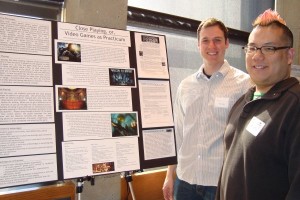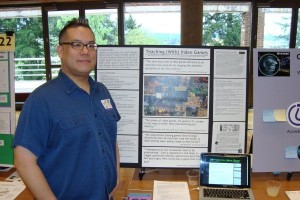The UW Teaching and Learning Symposium, hosted each year by the Scholarship of Teaching and Learning Forum, brings together faculty, graduate students, and staff to present via poster sessions their ideas, experiences, and best practices in teaching. It was an eye-opening opportunity to see not only what other instructors and teachers were doing across campus but also to see where the digital humanities and specifically video game studies fit into the campus’s larger pedagogical map. Though attention to the use of games and other digital technology is growing at UW, I realized that there was a definite need to foreground the kinds of critical and cultural work on video games that I employ in my classes, particularly engaging questions about “digital natives” and video games as worthwhile objects of analysis. I developed and presented posters (with Timothy Welsh) at the 2010 and 2011 Teaching and Learning Symposiums.
2011 Description: “Close Playing, or, Video Games as Practicum”
Building on our work on “Teaching (with) Video Games” from last year’s symposium, this year’s presentation engages the question, “How do you critically play and analyze video games?” Drawing on our 2-credit Winter 2011 focus group class called “Close Playing, or, Bioshock as Practicum,” we will define and demonstrate the practice and pedagogy of “close playing” and “paired playing” to think about ways to read, analyze, and play video games like you would close read a novel or a film. Like close reading, close playing requires careful attention to how the game is played (or not played), to what kind of game it is, to the design of the game, to what choices are offered (or not offered) to the player, to what the goals of the game are, to how the game interacts with and addresses the player, to how the game fits into the real world, and so on. In other words, before we can take video games as serious objects of study, we need to develop ways to frame them, study them, and to seriously play them.
2010 Description: “Save Points: Teaching (with) Video Games”
As part of the Critical Gaming Project (CGP) at UW, we have offered several undergraduate CHID and ENGL courses on video games. Like reading, watching films, and argumentative writing, playing and critiquing video games is an acquired skill, a “digital” literacy. Ironically, students, who are assumed to be enthusiastic and embracing of games, are often resistant to analyzing video games — to do so would take the “fun” out of games. Therefore, drawing on our experiences developing, teaching, and assessing these courses, this session hopes to explore and illuminate the ways video games can be brought into the classroom, the challenges and logistics of using video games, and most importantly, different critical approaches to playing and teaching video games. Our session will include interactive examples of game play and video game pedagogy.
For more detailed information about my teaching, see the following:
- Teaching Philosophy
- Teaching (with) Technology
- Courses Taught by Year
- Courses Taught by Topic
- Teaching Evaluations
- Sample Syllabi
- Videos
- Research Exposed!
For other sections of my portfolio, go to:
- Dissertation
- Keywords Project
- HASTAC Scholars
- Critical Gaming
- Awards
- Websites
- Research Exposed!
- Teaching (With) Technology
- MA Thesis
- Portfolio Overview

